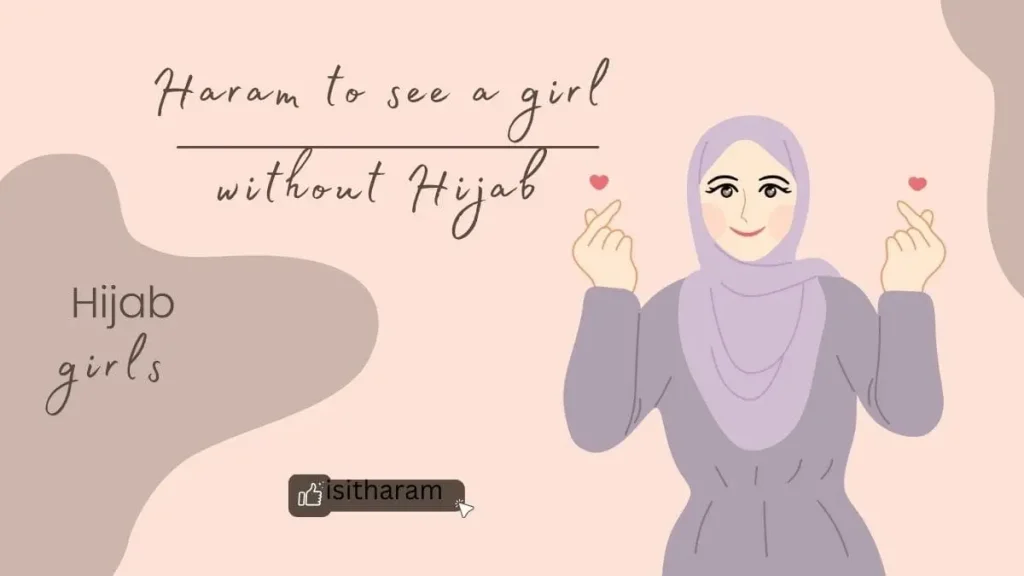Hijab is a very simple and effective way to protect the chastity of both men and women. So the question is relevant, Is it haram to see a girl without Hijab? Because basically hijab is a symbol of beauty and dignity of women. Protection of women’s chastity and dignity.
It is possible to achieve purity of heart and mind by following the rules of hijab. In this context, Allah Ta’ala says, ‘This provision is a cause of greater purity for you and their hearts.’ (Surah Ahzab: 53)
Islam has imposed the rules of veiling mainly with the aim of eliminating obscenity and adultery and to avoid social evils and sedition. Did not do any kind of injustice or discrimination against women.
Rather, to protect their purity and chastity, full compliance with this law has been made essential for them. In this context, Allah Ta’ala says, ‘Allah only wants to remove impurity from you and purify you completely.’ (Surah Ahzab: 33)
What is hijab for a girl?
Hijab means to cover, to cover, to cover, to hide, to hide, to cover, to cover beauty with clothes, to cover or conceal, etc.
In terms of Islamic Shari’ah, Hijab is the veil that is prescribed by Shari’ah between men and women for the purpose of attaining the chastity of character.
Others say that the special system that Islam has formulated to hide the external and internal beauty of women from the eyes of men is called Hijab.
Basically, hijab means not only a covering of clothing, but a whole social system, which includes various measures to prevent impure and illicit relations between men and women and oppressive behavior of men towards women.
Is it haram to see a girl without hijab?
Yes, it is haram to see a girl without Hijab. Hijab is a great boon from the Islamic Shari’ah to the society in general and to the women of the Ummah in particular. This provision is basically a hidden document of correctness, completeness and infallible provision of Islamic Shari’ah for all time.
There is no substitute for Hijab to keep the human society pure and free from impurity. Especially for the protection of the youth and young generation of the present society and for the safety of women, the full observance of veiling is the need of the hour.
Evidence of haram to see a girl without hijab
Allah says in Surah Noor, “O Prophet, say to the believing men that they restrain their gaze and guard their private parts. This is more sacred for them. … And say to the believing women that they restrain their gaze and guard their private parts.”
Buraydah narrated that the Prophet (PBUH) said to Ali (RA), “O Ali! Do not give a second glance after one glance. The first glance is forgiven but the second glance is not forgiven.” (Ahmad, Tirmidhi, Abu Dawud, Daremi)
Jarir Ibn Abdullah Bajali said, I asked the Prophet (PBUH), what should I do if my eyes suddenly fall. He said, turn your eyes or lower them. (Muslim, Ahmad, Tirmidhi, Abu Dawud, Nasa’i)

Why is it haram to see a girl without hijab?
Allah Ta’ala forbids Muslim men to look at other women. Therefore it is haram to see a girl without hijab. Because hijab is an essential provision of Islam to be observed all the time. It is a clear and obligatory provision such as prayer, fasting, Hajj, Zakat etc.
Allah Ta’ala is the originator of this law. In this context, Allah Ta’ala says, ‘When you ask for something from them, ask from behind the curtain. This provision is a cause of greater purity for you and their hearts. (Surah Ahzaab: 53)
The demand of faith is to be completely devoted to this law. There is no room to take this provision lightly or to disobey it. Because no one has the right to oppose the clear provisions of Islamic Shari’ah.
In this context, Allah Ta’ala says, ‘When Allah and His Messenger order something, there is no right for a believing man or a believing woman to disobey that thing. And whoever disobeys Allah and His Messenger is surely astray.’ (Surah Ahzab: 36)
Seeing a girl without Hijab is a sin
It is a sin to see a girl without a hijab just as it is a sin for a girl to go out of the house without a hijab. This is due to disobeying the instructions of the Holy Quran. It is not only a sin but will be punished in the Hereafter.
Regarding Hijab, Allah Ta’ala said, ‘O Prophet, tell your wives, daughters and believing women to pull a part of their Jilbab over themselves. It will be easy to recognize them. As a result they will not be bullied. And Allah is Most Forgiving, Most Merciful.’ (Surah Ahzab: 59)
In this verse, the importance of walking with Hijab is mentioned that if you walk with the veil, everyone will understand that they are noble and characterful women. As a result, no one will dare to tease veiled women.
In fact, those who walk without the hijab most of the time are the ones who face all kinds of torture, including eviction and rape, and they are the ones who suffer the most trouble on the streets. Therefore, the importance of the veil is immense to protect the chastity and dignity of women.
Hijab is also given special importance in Hadith Sharif. It was narrated from Hazrat Abdullah (R.A.) that the Messenger of Allah (S.A.W.) said, “Woman is a veiled object.” When she comes out veiled, Satan looks up at her. (Tirmidhi: 1173)
It is narrated in another hadith, Ali (R.A.) narrates that once he was with Rasulullah (Sallallahu Alaihi Wasallam). Then the Prophet (peace and blessings of Allah be upon him) said (to the Companions), “Which is the best thing for women?” They fell silent. (no one could tell)
All girls can be seen without hijab
One can see one’s wife or Muharram women without hijab. It is not right for a man to look at anyone other than them. But it is forgivable if it is suddenly overlooked. But if it seems attractive at first glance, it is unforgivable to look back.
The Prophet (peace be upon him) called this kind of sight the zina of the eyes. He says, “Man commits jina through all his senses. Seeing is jina of eyes, jina of slurred voice, jina of ears that listen with pleasure, jina of hands and feet moving with illicit intentions.”
When these roles of fornication are fully fulfilled, the places of shame either fulfill it or refrain from fulfilling it. (Bukhari, Muslim and Abu Dawud)







